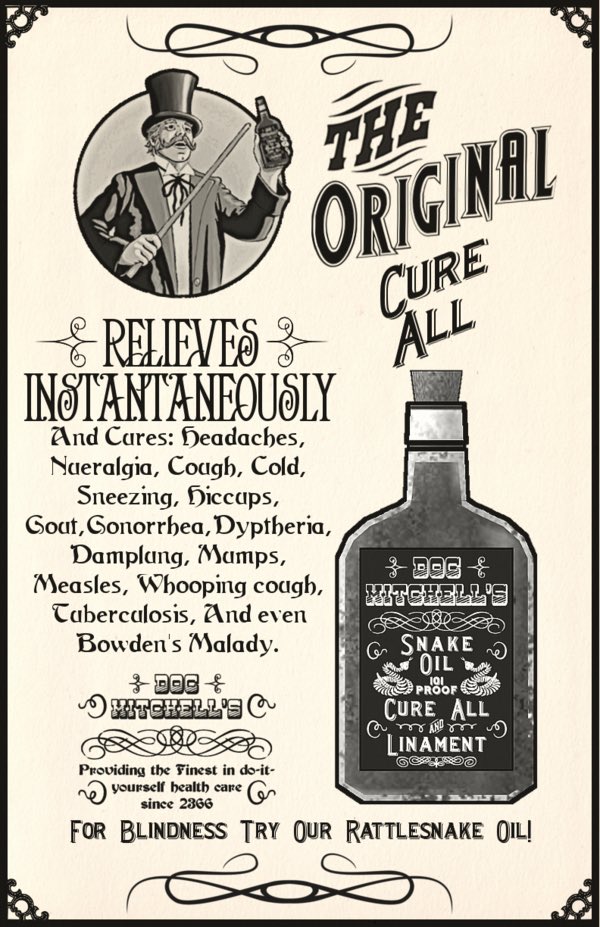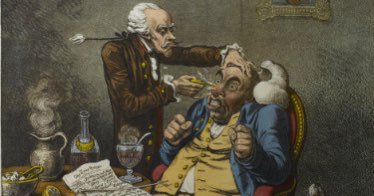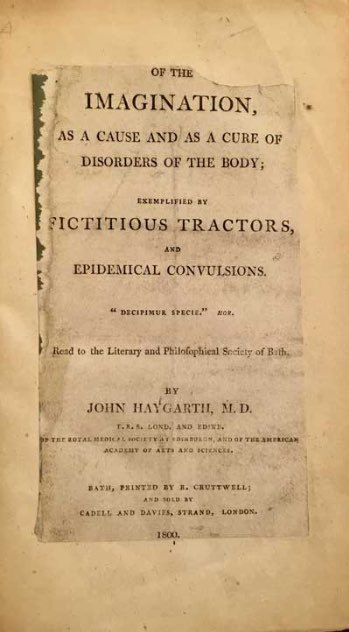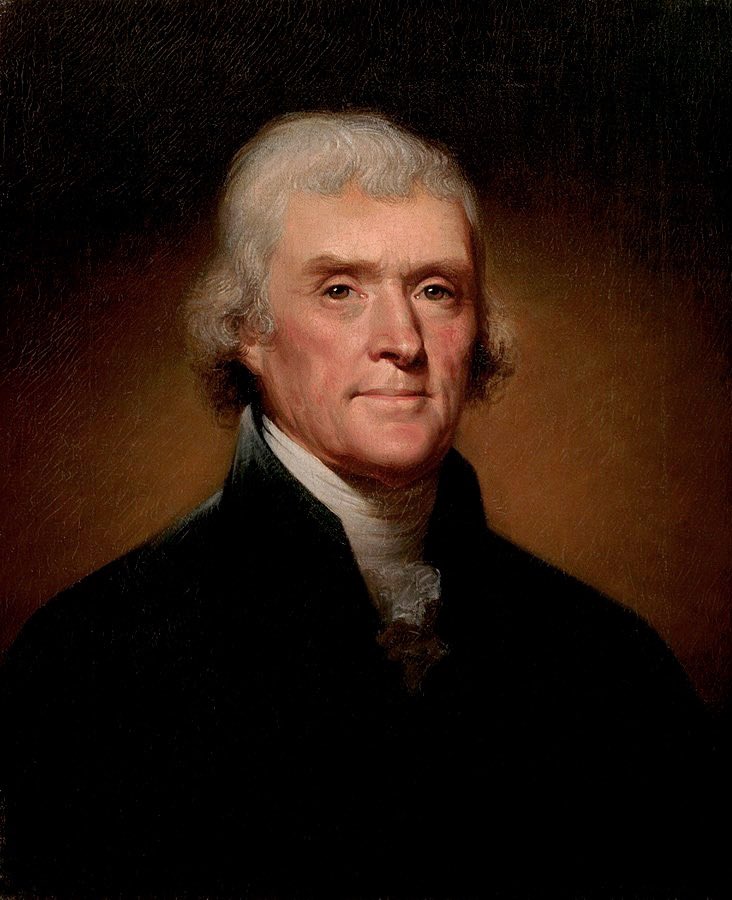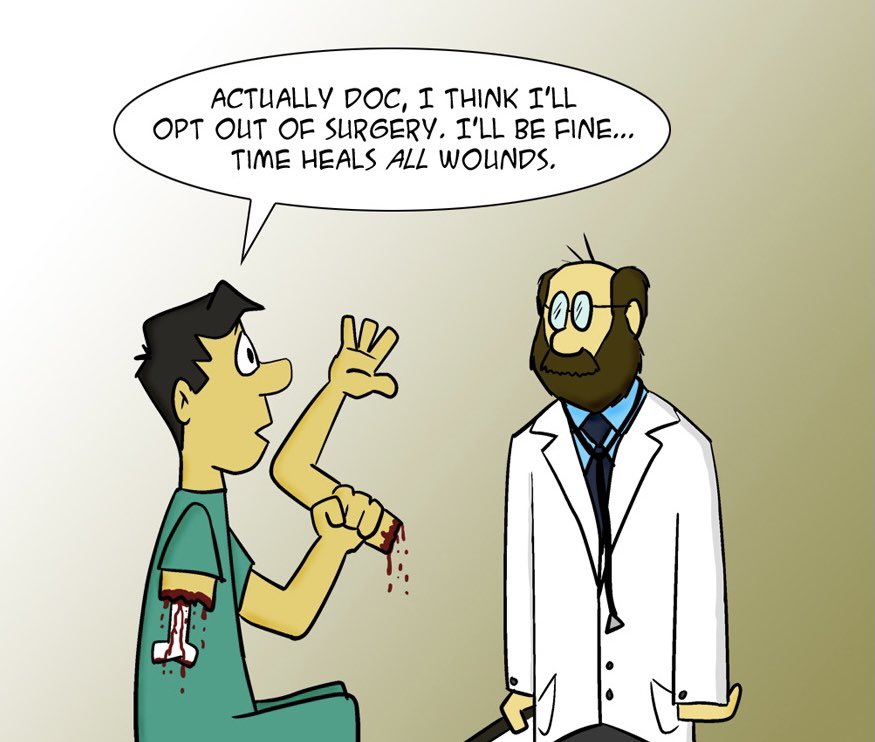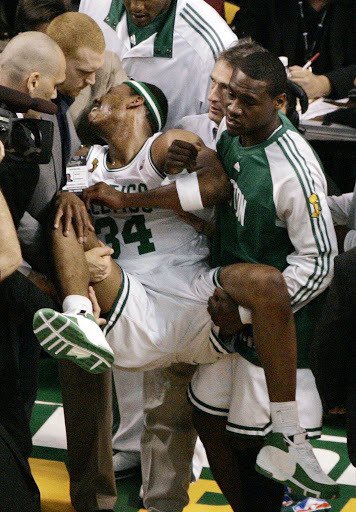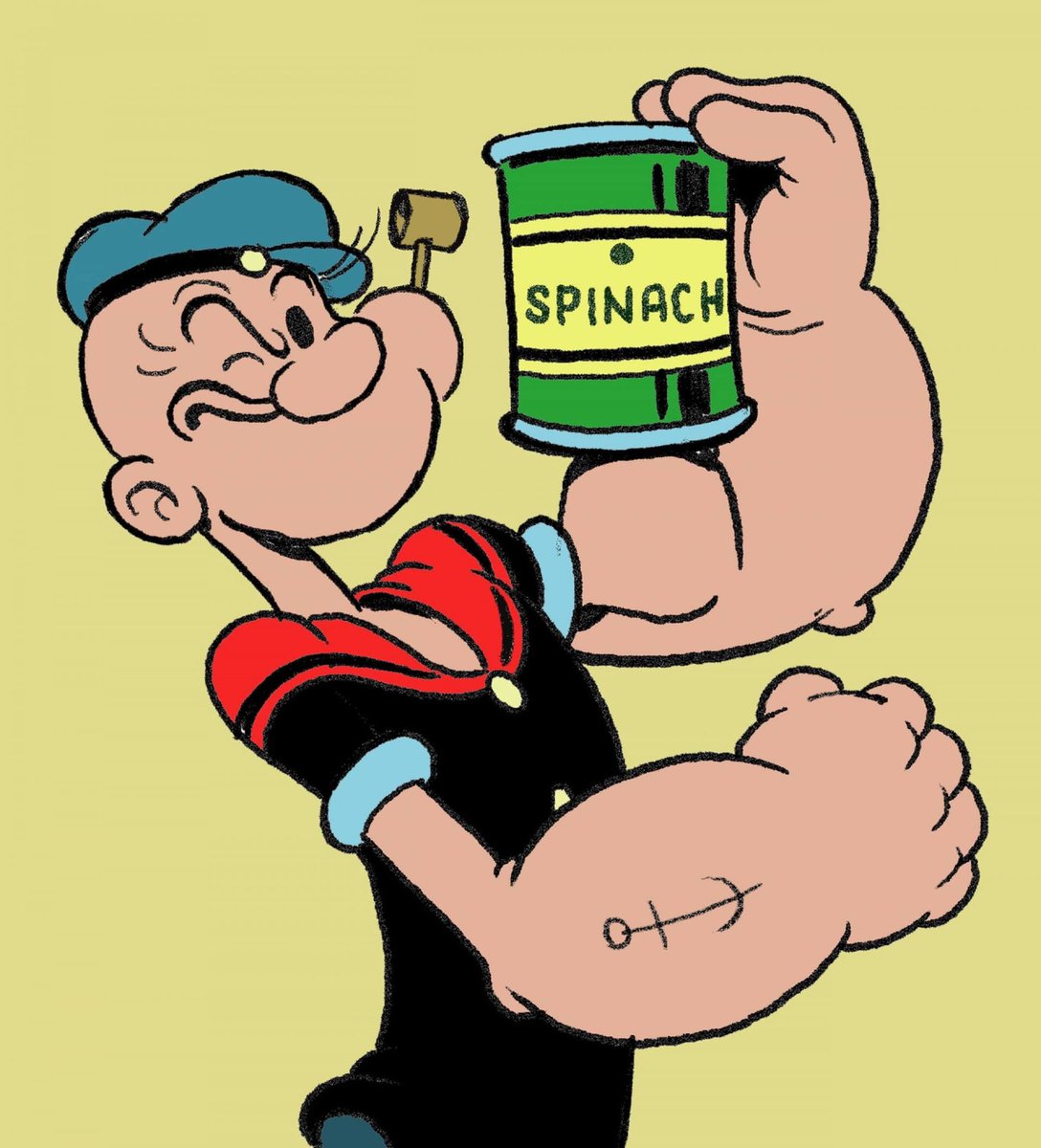Placebo Effect 101
A snake oil salesman is a trader in lies and false cures. Deceitful, sure. But, is there any harm if it works?
And besides, lost over the years is the inconvenient fact that snake oil did, in fact, work.
Here’s Placebo Effect 101...



A snake oil salesman is a trader in lies and false cures. Deceitful, sure. But, is there any harm if it works?
And besides, lost over the years is the inconvenient fact that snake oil did, in fact, work.
Here’s Placebo Effect 101...



1/ Placebo Effect refers to the phenomenon that occurs when a positive benefit is produced from a ‘placebo’ drug or treatment.
Essentially, because you *believe* the placebo works, your mind activates your body chemistry and the psychological now becomes physiological.
Essentially, because you *believe* the placebo works, your mind activates your body chemistry and the psychological now becomes physiological.
2/ The earliest reported example of the placebo effect occurred in 1799.
Elisha Perkins, a Connecticut surgeon had invented two metal rods which, when rubbed over a painful area were touted to draw disease from the body.
Even George Washington bought a set of Perkins tractors.
Elisha Perkins, a Connecticut surgeon had invented two metal rods which, when rubbed over a painful area were touted to draw disease from the body.
Even George Washington bought a set of Perkins tractors.
3/ While Perkins tractors were busy curing everything from gout to rheumatism, one British physician was unimpressed.
Convinced Perkins was a quack, John Haygarth set out to “treat” rheumatism patients with look-alike rods - lo and behold 4 of 5 reported their pain subsided.
Convinced Perkins was a quack, John Haygarth set out to “treat” rheumatism patients with look-alike rods - lo and behold 4 of 5 reported their pain subsided.
4/ Thusly, Haygarth later wrote, the cure was all in their head.
Perhaps, but is that really so bad?
Rather than debate semantics of why a positive outcome occurred, couldn’t it be just as valuable *that* it occurred?
Perhaps, but is that really so bad?
Rather than debate semantics of why a positive outcome occurred, couldn’t it be just as valuable *that* it occurred?
5/ A decade later, Thomas Jefferson spoke to the possible power of the placebo effect:
“One of the most successful physicians I’ve ever known has assured me that he used more bread pills, drops of colored water, powders of hickory ashes than of all other medicines put together.”
“One of the most successful physicians I’ve ever known has assured me that he used more bread pills, drops of colored water, powders of hickory ashes than of all other medicines put together.”
6/ Unfortunately, the placebo effect tends to get a bad rap for its role in exposing treatments as fraudulent.
We’re so often focused on the merit of the treatment itself, we dismiss any improvements as “just placebo”.
Whatever you call it, the improvements are very real!
We’re so often focused on the merit of the treatment itself, we dismiss any improvements as “just placebo”.
Whatever you call it, the improvements are very real!
7/ In his usual eloquence @JamesClear wrote, “if you believe something works, then it probably works. But not always for the reasons you thought...”
So what, then, are the reasons it works? https://jamesclear.com/power-of-placebo
So what, then, are the reasons it works? https://jamesclear.com/power-of-placebo
8/ Regression to the mean
Simply put, you get better with time.
As you might expect, this is most common in response to pain or illness.
Still, the mere belief you are getting better may further cause your brain to release endogenous opioids, and—voila—you recover faster.
Simply put, you get better with time.
As you might expect, this is most common in response to pain or illness.
Still, the mere belief you are getting better may further cause your brain to release endogenous opioids, and—voila—you recover faster.
9/ Confirmation bias
If you expect an intervention to produce a positive effect, you begin to focus on the outcome and may improve related behaviors.
A gimmick exercise plan may be ineffective, but if you believe it works & eat better as a result, you’ll probably end up fitter.
If you expect an intervention to produce a positive effect, you begin to focus on the outcome and may improve related behaviors.
A gimmick exercise plan may be ineffective, but if you believe it works & eat better as a result, you’ll probably end up fitter.
10/ Expectations and learning
Cues from our environment teach us how to respond—i.e. when we take a pill, we feel better.
In elite sport, many-a-player have risen from “doubtful”—to play on game day—with the equivalent of a Flintstone vitamin, and a charismatic doc or trainer.
Cues from our environment teach us how to respond—i.e. when we take a pill, we feel better.
In elite sport, many-a-player have risen from “doubtful”—to play on game day—with the equivalent of a Flintstone vitamin, and a charismatic doc or trainer.
11/ Pharmacological conditioning
Similar to Pavlov’s dogs, our brain learns to associate a pill with relief and kick-start its own form of chemistry.
This may have implications with painkillers. Swapped for a placebo after a number of days, the opioid system still activates.
Similar to Pavlov’s dogs, our brain learns to associate a pill with relief and kick-start its own form of chemistry.
This may have implications with painkillers. Swapped for a placebo after a number of days, the opioid system still activates.
12/ Social learning
When you see someone else have a positive response from a placebo, you tend to have a greater response from it yourself.
Look no further than little kids. Show the power of a kiss on an ‘owie’, and magically it heals all wounds.
Big kids fall for it too
When you see someone else have a positive response from a placebo, you tend to have a greater response from it yourself.
Look no further than little kids. Show the power of a kiss on an ‘owie’, and magically it heals all wounds.
Big kids fall for it too

13/ Human connection
Warmth, empathy, and communication of a positive expectation can all significantly improve the outcome.
Give a shooter the ‘green light’ and watch what happens. “I believe in you” can be like jet fuel.
Confidence is a helluva drug!
Warmth, empathy, and communication of a positive expectation can all significantly improve the outcome.
Give a shooter the ‘green light’ and watch what happens. “I believe in you” can be like jet fuel.
Confidence is a helluva drug!
14/ The placebo effect may even make you stronger.
In a 1972 study, Gideon Ariel convinced 15 athletes the placebo pills they were being administered were instead steroids.
The result?
In 4 weeks, they added an average of 19kg to their squat versus 2.6kg in the 7 weeks prior.
In a 1972 study, Gideon Ariel convinced 15 athletes the placebo pills they were being administered were instead steroids.
The result?
In 4 weeks, they added an average of 19kg to their squat versus 2.6kg in the 7 weeks prior.
15/ Even the  himself (yes, I’m referring to Mike) tapped into the placebo effect.
himself (yes, I’m referring to Mike) tapped into the placebo effect.
MJ wore his college shorts under his Bulls uniform every game—without fail.
But that’s just a superstition, you say?
Indeed it is, AND this behavior can lower anxiety and enhance performance.
 himself (yes, I’m referring to Mike) tapped into the placebo effect.
himself (yes, I’m referring to Mike) tapped into the placebo effect.MJ wore his college shorts under his Bulls uniform every game—without fail.
But that’s just a superstition, you say?
Indeed it is, AND this behavior can lower anxiety and enhance performance.
16/ Placebo or not - what works, works.
Still, for all its mystique, the placebo effect—like Santa Claus—can’t exist if we don’t believe.
So, next time you want to get technical as to why something is working, maybe try not to be a buzzkill & just let the mind work it’s magic.
Still, for all its mystique, the placebo effect—like Santa Claus—can’t exist if we don’t believe.
So, next time you want to get technical as to why something is working, maybe try not to be a buzzkill & just let the mind work it’s magic.
17/ If you want to learn more about how psychology drives our physiology, ‘Why Zebras Don’t Get Ulcers’ is foundational!
https://www.amazon.com/dp/0805073698/ref=cm_sw_r_cp_awdb_imm_t1_hoLdGb611DBBW
Some aditional resources:
https://www.vox.com/platform/amp/science-and-health/2017/7/7/15792188/placebo-effect-explained
https://knowablemagazine.org/article/mind/2017/imagination-effect-history-placebo-power
https://www.newenglandhistoricalsociety.com/perkins-metallic-tractors-connecticuts-cure-everything-ails/
https://afshinpsychology.wordpress.com/2012/02/18/superstition-the-irrational-placebo-effect/
https://www.amazon.com/dp/0805073698/ref=cm_sw_r_cp_awdb_imm_t1_hoLdGb611DBBW
Some aditional resources:
https://www.vox.com/platform/amp/science-and-health/2017/7/7/15792188/placebo-effect-explained
https://knowablemagazine.org/article/mind/2017/imagination-effect-history-placebo-power
https://www.newenglandhistoricalsociety.com/perkins-metallic-tractors-connecticuts-cure-everything-ails/
https://afshinpsychology.wordpress.com/2012/02/18/superstition-the-irrational-placebo-effect/
18/ So, that was Placebo Effect 101.
If you enjoyed it, follow me for more inspirational threads to unlock that next level of performance in yourself and others.
You can read the rest of my threads by entering the rabbit hole here https://twitter.com/jbonhotal/status/1351178613937364995
https://twitter.com/jbonhotal/status/1351178613937364995
If you enjoyed it, follow me for more inspirational threads to unlock that next level of performance in yourself and others.
You can read the rest of my threads by entering the rabbit hole here
 https://twitter.com/jbonhotal/status/1351178613937364995
https://twitter.com/jbonhotal/status/1351178613937364995

 Read on Twitter
Read on Twitter